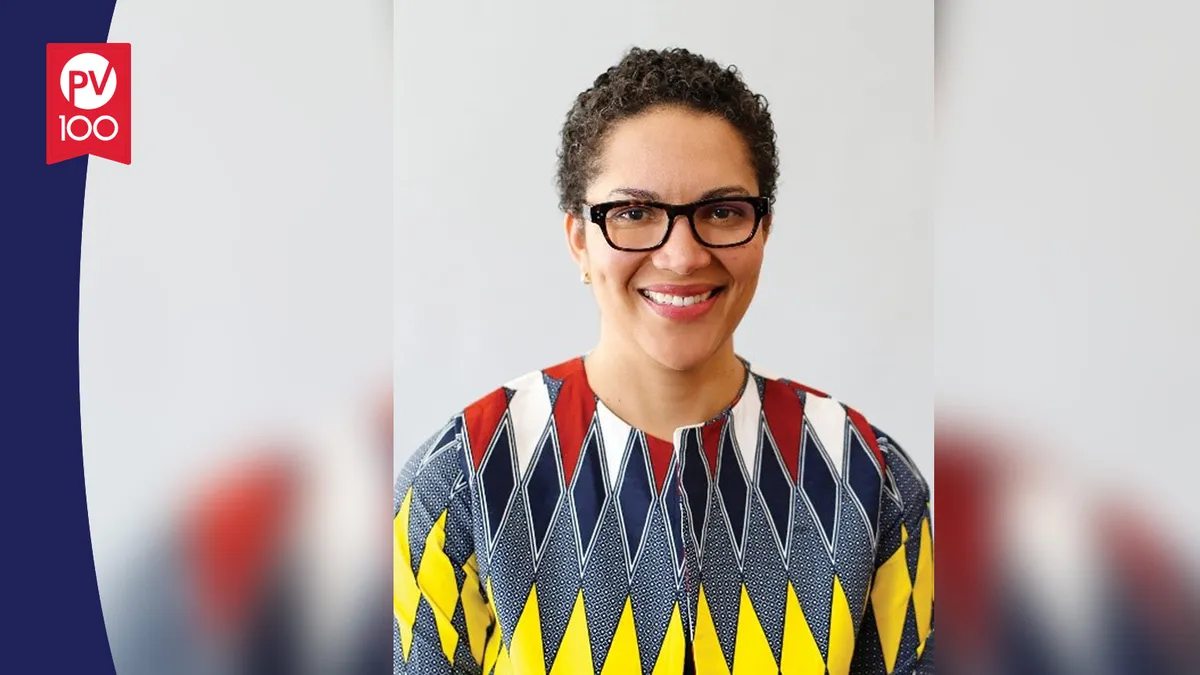Editor’s note: This story is part of our 2022 PharmaVoice 100 feature.
Dr. Mary-Ann Etiebet, Merck’s associate vice president of health equity, keeps all the thank-you notes that she receives in one corner of her desk. Unsurprisingly, she has to use a large desk — especially given the impact she makes as lead of Merck for Mothers.
“The letters remind me of all the different ways that the work we are doing is making a difference in people’s lives, and how grateful and privileged I am to be able to do this work,” she says.
Merck for Mothers, now in its 11th year, helps “create a world where no woman has to die while giving life.”
“In 2022, Merck reaffirmed its commitment to the global initiative with an additional $150 million in funding. We have set a goal of reaching 25 million women by 2025 and ensuring all of them have access to high-quality, safe and respectful maternity care,” Etiebet says, adding that since the program began, Merck has reached more than 18 million women in over 60 countries.
The program is one of several ways Etiebet’s career has been geared towards health equity strategies — a pursuit that emerged from her personal experiences growing up in Nigeria and seeing the vast health inequities among its population. She has also been driven by the loss of a family member to an avoidable maternity health crisis.
Colleagues across the Merck enterprise are inspired by Etiebet’s dedication for ensuring that health equity is part of the company’s day-to-day business strategy, and how the organization thinks about the value it brings to all the communities that it serves.
"The pandemic, remote work and the recent social justice movements have led me to become more intentional about honing practices and behaviors that strengthen connectivity and build trust."
Dr. Mary-Ann Etiebet
Associate vice president of health equity, Merck
“It’s part of thinking about how we reflect our values in our business and in the decisions that we are making around what products to bring to market, how to get them to market [and] how to ensure that they are having the broadest access possible,” she says.
During her appearance on PharmaVoice’s Woman of the Week podcast earlier this year, Etiebet noted that “as a pharmaceutical company, we may not have the right expertise or we may not be the best placed organizations to lead on these solutions, but what we can do is bring people together who have a shared vision and have shared goals and bring the best of what we can offer to creating those solutions that, again, will need to be multifactorial and will need to address so many of the barriers that currently exist in our healthcare ecosystem.”
For almost two decades, Etiebet has dedicated herself to changing health outcomes for the most vulnerable patient populations — from her extensive experience working with HIV patients as a physician and researcher, to advocating for women in marginalized communities, to being an international influencer working with development partners to “design, manage and evaluate programs that address the needs of vulnerable and at-risk populations.”
Colleagues say her infectious dedication and willingness to ensure “every voice has a seat at the table,” are just a few of the leadership qualities that make her a stand out within the company.
Beyond her work at Merck, Etiebet is a sought-after speaker and serves as a member of the Center for Global Development Board of Directors, the Board of Trustees of Vital Strategies, and the Advisory Committee for the Pozen-Commonwealth Fund Fellowship in Health Equity Leadership at Yale University. Etiebet also serves on the Investors Group of the World Bank’s Global Financing Facility for Women, Children and Adolescents.
Here, Etiebet shares what drew her to the life sciences, the challenges she is committed to addressing and her keys to leadership success.
PharmaVoice: What initially drew you to the life sciences industry?
Dr. Mary-Ann Etiebet: The role that the industry plays in helping to solve the world’s most complex health challenges. We saw it during the HIV/AIDS pandemic, and more recently with the COVID-19 pandemic.
I also wanted to see what more could be achieved by leaning into the power of the private sector to improve health outcomes for communities around the world. In my previous roles, as a physician and public health practitioner, solutions were strongest with varied expertise and experiences at the table; oftentimes, meaningful and sustainable impact required cross-sector collaboration.
What keeps you up at night?
Mis- and disinformation are a top threat to global health. We are all hearing, seeing and learning vastly different things through social media and other sources of information. These divergent reality systems are making it increasingly difficult to mobilize people around solutions to shared problems.
How would you describe your leadership style?
Inclusive, and my goal is for it to be transformative — for myself, for my team and for the clients and communities we serve. I push my teams to think big, use their powers, hold themselves accountable and remain teachable. I also believe it is important to create opportunities for everyone’s voice to be heard; environments where everyone gets to practice and hone their leadership skills.
What is your key piece of leadership advice?
If you take care of your team, they’ll take care of the rest. I have also been known to compare leadership lessons to motherhood. When my daughters tell me to let them do things on their own and ask me to trust them, I am reminded that good leaders leave their teams feeling empowered. When my daughters try to make me choose whose cookies are the best, I am reminded that the diverse contributions of team members need to be acknowledged and valued. When I discover how different my daughters are from me, as well as from each other, I am reminded that good leaders allow team members to lean into their strengths. When I find myself frustrated because I receive monosyllabic answers from my teenager, I am reminded that my team can’t read my mind, and I need to give direct and open feedback. And, as the specter of college grows closer and my daughters prepare to leave the ‘nest,’ I am reminded that good leaders open doors and look for opportunities for team members to move on and move ahead.
How are you paying your success forward?
I always try to open doors and make connections that create opportunities for others to grow in their careers, as well as to provide whatever support or guidance I can to better enable their success. I’m also very upfront about sharing what I’ve learned on my journey — the more data points people have access to, the better decisions they can make.
What is the single most important trend that you are tracking?
The rise of ESG [environmental, social and governance] investing is incentivizing companies to commit in substantive ways to utilizing the range of tools at their disposal to help create more inclusive, equitable and sustainable societies. It is exciting to see how this movement is surfacing new opportunities for growth, fueling even more innovation, and getting us closer to more equitable health outcomes.











